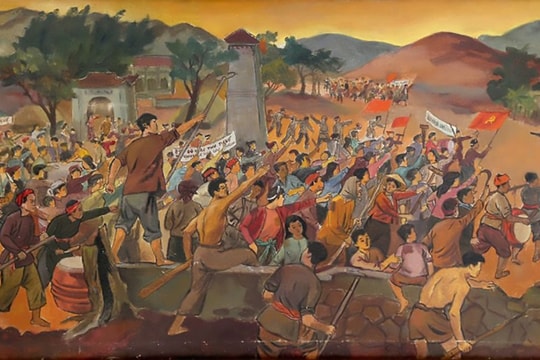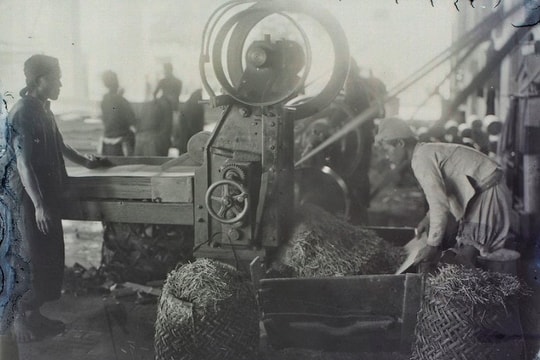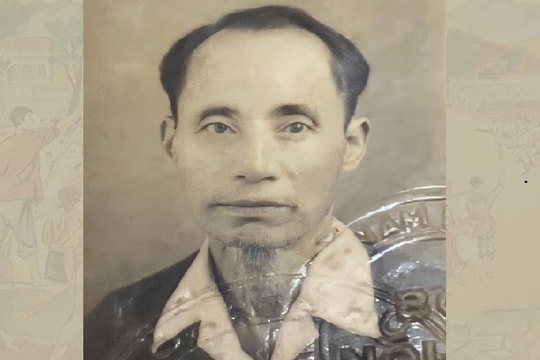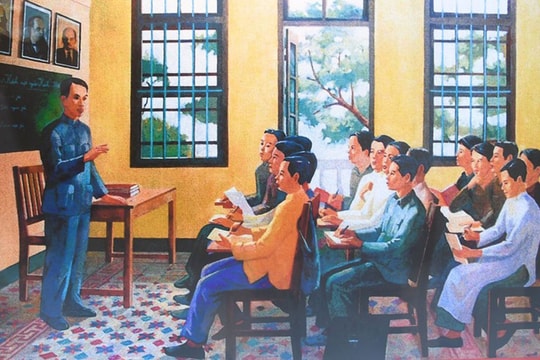Comrade Nguyen Thi Sinh - an outstanding female Soviet soldier from her hometown Thanh Chuong
In her youth, Nguyen Thi Sinh worked as a housemaid for Phan Boi Chau, who was living in Hue. During this time, she had the opportunity to learn and absorb Phan Boi Chau's passionate poems and literature about patriotism. These were the tools that helped her use them as a propaganda weapon, encouraging people to fight in the revolutionary activities later on.
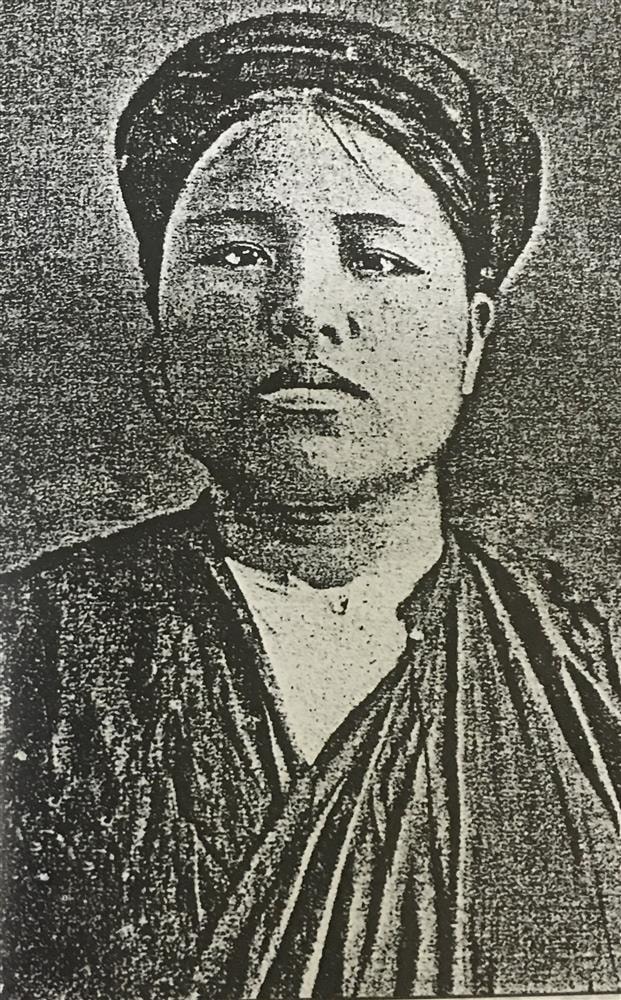
Comrade Nguyen Thi Sinh's birth name was Nguyen Thi Van (also known as Nguyen Thi Em, Nguyen Thi Van), born in 1910, in a middle-class family with many siblings in Thanh Tuong commune, Thanh Chuong district, Nghe An province. Although she was the youngest child in a family of 9 brothers and sisters, her parents, Mr. Nguyen Quang Phong and Mrs. Nguyen Thi Nguyet, still gave her a thorough education.
From a young age, Nguyen Thi Sinh went to school with teachers in the village. Naturally intelligent, studious, and gifted in poetry, she memorized many patriotic poems by scholars of that time.
In 1928, when she was just 18 years old, her parents sent her to Hue to continue studying at the "Home Economics" school. After that, she went to help the house of Mr. Phan Boi Chau who was living in Hue. During this time, she had the opportunity to learn and absorb Mr. Phan's passionate poems and literature about patriotism. The poems penetrated deeply into her soul, becoming her first luggage in life to help her use as a propaganda weapon, encouraging people to fight in the revolutionary activities later. In early 1930, leaving Hue, Nguyen Thi Sinh returned to her hometown and participated in local activities.
On the occasion of International Labor Day, May 1, 1930, the Party Central Committee issued a call for struggle. The Central Party Committee and the Provincial Party Committees of Nghe An and Ha Tinh actively responded to the Party's policy. On April 24, 1930, the Nghe An Provincial Party Committee held a conference to review the Party building work and discuss plans to mobilize the masses to fight to celebrate International Labor Day. To implement that policy, the Thanh Chuong Provisional District Party Committee met at the house of comrade Tran Trach (Vo Liet commune) to receive the policy of the Provincial Party Committee Conference and discuss plans to mobilize the masses. The conference decided to hang hammer and sickle flags and distribute leaflets throughout the district. Where conditions permit, rallies, speeches, and demands will be organized.
The District Party Committee members and cadres were assigned to the grassroots to organize the implementation of this resolution. The printing agencies in Xuan Lam and Vo Liet communes urgently printed thousands of leaflets to promptly distribute to the areas in the district. Being intelligent, agile and resourceful, Ms. Nguyen Thi Sinh was assigned to participate in printing documents and distributing leaflets...
From 2:00 a.m. on May 1, 1930, after the drum beat at the communal house of Ha village suddenly resounded with the sound of the five-string drum and the village cry resounded along the Giang river: "All the children of Lac and Hong, tomorrow morning, listen to the drum outside the communal house and go protest early."
On the morning of May 1, 1930, comrade Nguyen Thi Sinh and nearly 3,000 farmers from Hanh Lam, La Mac, Nhuan Trach, Yen Lac, and Duc Nhuan villages brought spears, hoes, and rakes to Ky Vien's plantation to make demands, but he was frightened and fled. The people destroyed all of his houses, buffalo and cow barns, and his orchards. Ky Vien's plantation was engulfed in flames.
Promoting the victory of the struggle on May 1, 1930, cadres and party members, including comrade Nguyen Thi Sinh, enthusiastically devoted themselves day and night to building and developing the Party base, mass organizations and self-defense forces. The struggle movement was launched widely in villages and communes with vibrant struggles.
Ms. Nguyen Thi Sinh worked day and night, actively propagating the Party's policies and guidelines and enthusiastically participating in direct struggles with the enemy. With these activities, she was followed by secret police and fell into the hands of the enemy and was imprisoned at Vinh Prison on June 14, 1930.
In prison, the enemy used every trick to torture her both physically and mentally. Despite dying and coming back to life many times, she remained steadfast and loyal to the Party. Unable to get anything out of Nguyen Thi Sinh, the French colonialists sentenced her to 3 years in prison and 3 years of house arrest. During her days in prison, the soldiers assigned her the task of carrying food from the contractor's house to the prison for her comrades or to do the cleaning.
In June 1930, the Vinh Prison Party Cell was established with comrade Hoang Trong Tri as Secretary. The cell connected with the Party base outside and led the prisoners in the struggle, influenced many guards, and created confidence for political prisoners in life-and-death moments with the enemy. Comrade Nguyen Thi Sinh was enlightened by the Party members and assigned the task of secret communication connecting the Party's communication bloodline from inside the prison to outside and vice versa. Together with the Prison Party Cell, she participated in organizing many struggles such as hunger strikes, cheers, protests against harsh prison regimes; condemning the crimes of French colonialism...
Ms. Sinh's active activities contributed significantly to the victory in the struggles, at the same time, strengthening the belief and motivating political prisoners to overcome the plots and tricks of the enemy. In August 1930, she was honored to be admitted to the Party at the Xich Party Cell (Vinh Prison). To facilitate the activities and struggles in prison, the Vinh Prison Party Cell established an additional female Party cell with comrade Nguyen Thi Phuc as Secretary.
Implementing the Party Central Committee's Directive, from October 1930, military propaganda work was closely coordinated between comrades inside and outside the prison. Comrades Nguyen Thi Sinh, Phan Phuc Tuong and a number of other comrades who had the opportunity to contact soldiers were assigned to carry out military propaganda work, connecting the supply and news routes from outside to the prison. Ms. Sinh took advantage of her free time to visit her brothers and sisters in the prison and inform them of important news.
In the memoirs of comrade Nguyen Thi Nhuan, it was recounted that: “The task of transporting medicine and clothes to Vinh Prison for political prisoners was assigned by the Party to comrade Van (ie Sinh)… Ms. Van was a talented propagandist who propagated and enlightened the soldiers, creating a safe and secret communication line. Through the help of the guards, the gifts were carefully wrapped and successfully transported to the prison through the line.”
At the end of 1931, comrade Nguyen Thi Sinh was released and placed under house arrest in her hometown. At the end of 1933, she left Thanh Chuong for Vinh city to do business, and was followed by the enemy on suspicion of escaping to continue her activities. From mid-1935 to 1937, she was hunted by Vinh secret police on suspicion of going to Ninh Hoa to work and then transporting communist documents between three regions in Nghe An.
From 1940 to 1947, she worked secretly and participated in the uprising to seize power in the locality. From 1948 to 1951, she was an economic officer of the Women's Union of Nghe An province. From 1952 to 1968, she actively participated in many activities such as taking care of children at Duc Anh Vien orphanage, participating in the Women's Executive Committee of Kim Lien commune...
In 1987, he retired at the Nghe Tinh Provincial Party Committee's Nursing Home, serving as Secretary of the Party Cell for Revolutionary Veterans for two terms (1995-1997). In 2010, due to old age and poor health, he passed away at the Nursing Home.
With her contributions to the revolutionary cause of the Party and the People, comrade Nguyen Thi Sinh was awarded by the Party and the State: Third-class Independence Medal; Third-class Resistance Medal; 60, 70, 80-year Party membership badges; Commemorative medal for soldiers captured and imprisoned by the enemy. These are noble awards for an outstanding female soldier from her hometown Thanh Chuong, rich in patriotic and revolutionary traditions.
-----
References:
- Thanh Chuong District Party Executive Committee:History of Thanh Chuong District Party Committee (1930-1975), National Political Publishing House, 2005, pp.57,58.
- Nghe An Provincial Party Executive Committee:Nghe An, Communist role models, Volume 5, Nghe An Publishing House, 2015, pp.164-174.

